Shell Goes to Court: Decades of Dubious Conduct in Nigeria
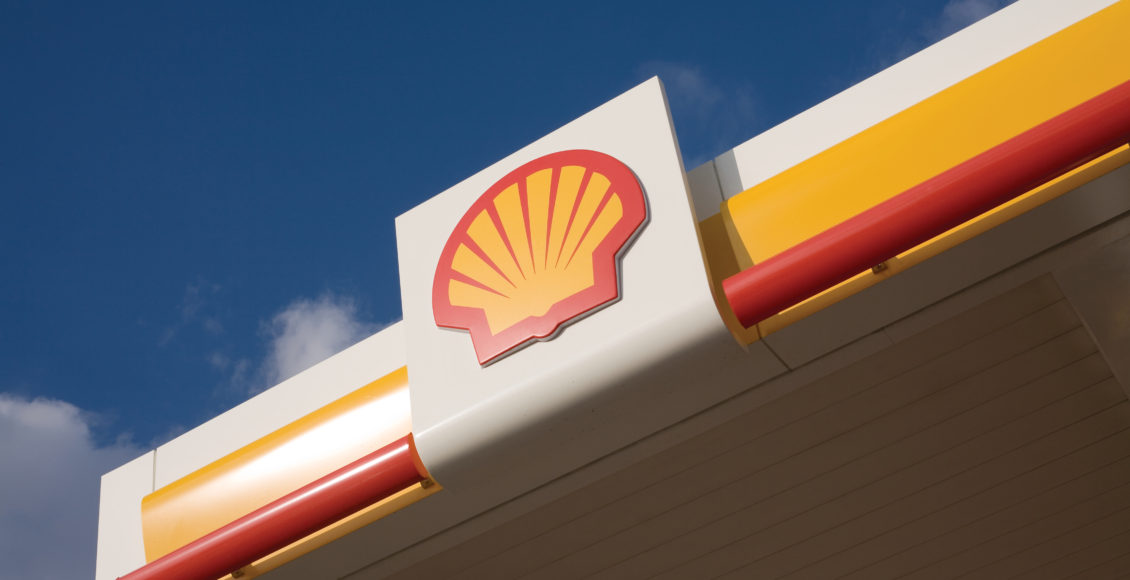 https://flic.kr/p/9d6uam
https://flic.kr/p/9d6uam
Royal Dutch Shell is embroiled in what could stand to be one of the largest corruption cases in the history of the oil and gas industry. In a dramatic investigation involving leaked emails, former M16 agents, and the alleged payment of $1.1bn to a convicted money-launderer, senior executives from Shell and Italian oil company Eni may be facing prison sentences. The case, being heard in Italy, charges Shell and Eni with international corruption over the 2011 purchase of an exploration license for OPL 245, a massive offshore oilfield in Nigeria. This ongoing case is but the most recent addition to a long history of Shell’s misconduct in Nigeria, where it has been criticized for complicity in human-rights abuses and extensive environmental destruction.
Shell’s operations in Nigeria began in 1936, and it is still the largest corporate actor in the country. Nigeria is Shell’s biggest producer outside of the United States, accounting for roughly 14% of the company’s production. The vast majority of onshore extraction operations take place in the Niger Delta. Despite housing roughly 90% of Nigeria’s proven 37bn barrels of oil reserves, it is the least developed region in the country. Decades of extraction without adequate compensation in the Delta has resulted in widespread local opposition to foreign petroleum companies operating in the region. Forms of local resistance have included peaceful protest, such as The Movement for the Survival of the Ogoni People (MOSOP), as well as militant groups like The Movement for the Emancipation of the Niger Delta (MEND) that attack and sabotage Shell facilities. Despite their opposing strategies, these two groups both seek a fairer share of oil revenue and compensation for environmental damage.
Not only the target of these opposition movements, Shell allegedly colluded with the 1990s Sani Abacha military government to violently suppress them. In 1990, playwright and environmental rights activist Ken Saro-Wiwa formed MOSOP. This non-violent movement campaigned for the rights of inhabitants of Ogoniland, a densely populated region of the Niger Delta.
By 1993 this campaign had gained significant support. Over 300,000 demonstrated against Shell, and successfully forced the company to suspend operations in Ogoniland. But mass protests resumed when Shell continued to lay a pipeline through the area, and the Nigerian military responded violently. This crackdown led to the unlawful killing of hundreds of demonstrators and culminated in the 1995 arrest of Ken Saro-Wiwa and eight other Ogoni men. The arrests sparked global outcry, and advocates around the world implored Shell to use its influence to negotiate their release. The company denied responsibility by deflecting and insisting that “it is not for a commercial organization to interfere with the legal processes of a sovereign state.”. In November 1995, the nine men were executed after a conviction by military tribunal.
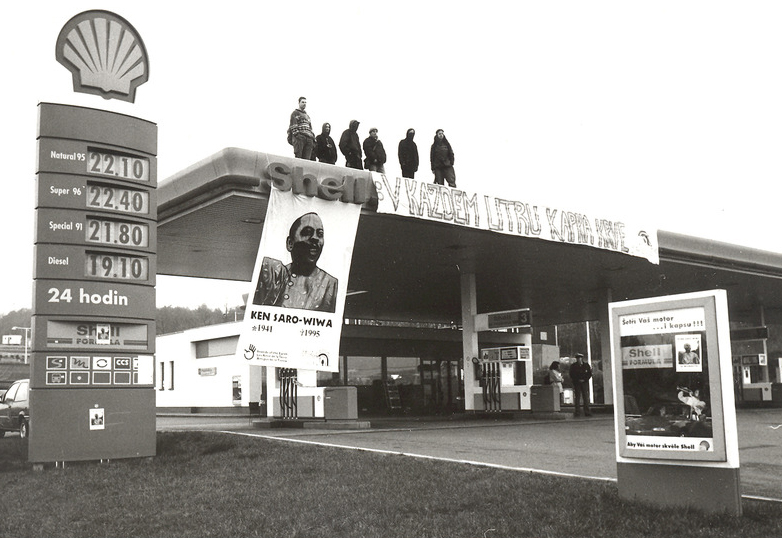
In 2009 Shell settled for $15.5 million in a case brought forth by relatives of the executed men, and other victims of the military’s violence during this period. The suit alleged that Shell conspired with Nigerian security forces to suppress the 1990s protests and participated in bribing witnesses to testify against Saro-Wiwa in his trial. Shell characterized the payment as a “humanitarian gesture” and settled without admitting any wrongdoing. The settlement worked to prevent the case evidence from being heard publicly.
That is until 2017, when Amnesty International released a report calling for a criminal investigation into Shell’s complicity in these human rights violations. The damning report was based on a review of thousands of internal company documents that reveal the role Shell played during this period. The documents show that Shell encouraged the military to take action against the peaceful movement, even offering financial and logistical support, despite being fully aware of the likely violent outcome. On one instance in 1993, Shell repeatedly requested the army’s assistance in Ogoniland to prevent protesters from blocking the laying of their pipeline, stressing the economic cost of disrupted production. Shell executives even went so far as to encourage the Nigerian military to refrain from releasing detained protestors unless the military “received commitments from their community to stop protests”.
The report also accuses Shell of offering to help Ken Saro-Wiwa while he was detained on the condition that he tone down his opposition to the company. In a memo sent by then-Chairperson in Nigeria, Brian Anderson, to his superiors in Europe, Anderson explains that he offered aid to Saro-Wiwa in exchange for MOSOP to “soften their official stance on two key issues for us. 1. The outrageous claims…against Shell for royalties and reparations,”. This document and others cited in the report suggest complicity in these crimes ran all the way up to Shell’s directors in The Hague and London. Shell responded to Amnesty International’s investigation with a categorical denial, calling the allegations “false and without merit”.
It remains to be seen whether this report and its evidence will in fact lead to legal action against the company. These allegations of complicity in unlawful killings, while extremely serious, are unrepresentative of the type of misconduct that usually brings Shell to the courtroom. More than 1,000 cases have been filed against Shell for oil spills in the Niger Delta.
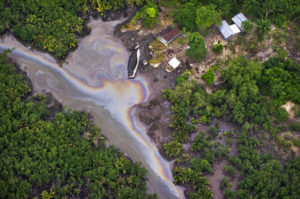
The Delta is one of the most polluted places in the world. In the last fifty years it is estimated that 546 million gallons of oil have been spilled, which is roughly equivalent to one Exxon Valdez spill every year. This has had a catastrophic effect on the environment, and subsequently on the communities where livelihoods depend on farming and fishing. A United Nations study on the extent of pollution in Ogoniland estimated that environmental cleanup and rehabilitation in this region alone would take 30 years, and over $1 billion. Shell resolves the majority of pollution complaints in Nigeria by paying a small fine or settlement, but two 2008 spills resulted in a much bigger legal headache for the company.
A Shell pipeline in the vicinity of Ogoniland town Bodo began leaking oil; the leak began October 5th 2008 according to Shell’s official report, or August 28th according to the community and Nigerian regulators. The leaking pipeline was repaired on November 7th, four weeks after Shell reported that it began, only to burst again a month later in December 2008. The second leak was not inspected or repaired by Shell until February 2009. Shell’s official report claimed that in total, only 1,640 barrels of oil were spilled in the first incident and 2,503 in the second, but independent assessments put the total somewhere between 100,000 and 300,000 barrels for the first spill alone. A group of 11,000 members of the Bodo community successfully took Shell to the London High Court over these spills. After years of legal maneuvering, the company paid a settlement of over $83 million and was forced to admit that it inaccurately reported the magnitude of the disasters in 2015. Court documents from this legal action additionally reveal that Shell has been aware of the faulty nature and disrepair of its pipelines in the Niger Delta for years. In a 2009 internal communication one Shell employee writes, “[the company] is corporately exposed as the pipelines in Ogoniland have not been maintained properly or integrity assessed for over 15 years”.
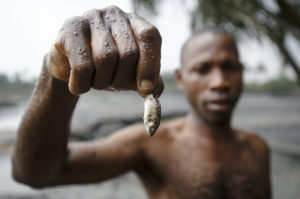
This is significant because Shell maintains that 98% of spills in the Delta are caused by theft and sabotage, rather than operational faults or pipeline corrosion. Although theft and sabotage are widespread phenomena in the region, Shell’s statistic is contested by community members. For example, Bodo community leaders claim that it was only after the 2008 spills, and the subsequent destruction of environment-dependent livelihoods, that some began to engage in oil theft. When Shell attributes the cause of a spill to third party activity, such as theft, affected communities may lose their right to compensation.
In March of this year, Amnesty International released another investigation into Shell’s corporate conduct in Nigeria, this time accusing them of serious negligence in responding to and reporting oil spills. The report calls for reinvestigation into 46 spills “about which there are reasonable doubts surrounding the cause provided by the [company]”. Additionally, the report condemns the company for its speed in responding to spills. Nigerian law requires companies to visit the site of an oil spill within 24 hours of reporting it, but Amnesty found that Shell complied with this regulation only 26% of the time. Shell’s response to this investigation was familiar, calling the allegations “false” and “without merit”. Much like Amnesty’s other report on human rights violations, it is not yet clear what, if anything, will come out of these allegations of misreporting and negligence.
Amnesty plans to present its recent findings to the Nigerian government, although the extent of their control over Shell’s practices is debatable. Wikileaks released cables from 2009 and 2010 that illustrate the depth of Shell’s influence in the Nigerian government. In one cable from a meeting between a Shell senior executive, Ann Pickard, and the U.S. ambassador, Pickard claims “Shell had seconded people to all the relevant [Nigerian government] ministries and that Shell consequently had access to everything that was being done in those ministries”. The leaked cables suggest an unsettling indifference on Shell’s part towards maintaining appropriate and transparent relationships with the governments of countries that they operate in. Considering Shell’s blatant disregard for the ecological hygiene of their operations in Nigeria, it is perhaps unsurprising that the company appears equally unconcerned with the political hygiene of their business with the country. If the contents of the Wikileaks cables do not demonstrate this apparent apathy, the ongoing corruption trial just might.
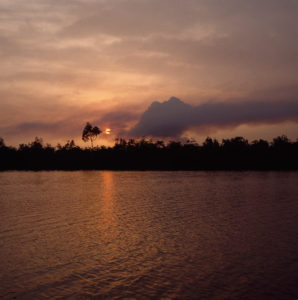
Shell and Eni are currently facing charges of bribery around the $1.3 billion purchase of the OPL 245 oil field. Before the 2011 deal, the license for OPL 245 was held by a Nigerian company called Malubu which was controlled by then-Oil Minister and convicted money-launderer, Dan Etete. To secure the license, the companies paid $1.1 billion dollars to the Nigerian government, but this money, which is more than Nigeria’s annual healthcare budget, quickly left the government accounts and was distributed as kickbacks. According to prosecutors, the money was transferred to Malubu and then distributed by Dan Etete to officials including Eni executive Roberto Casula, and then-President Goodluck Jonathan, among others. Initially, Shell denied any knowledge that money would go to Malubu or Etete, but it was forced to reverse its position when Global Witness released internal emails discussing the deal. The emails reveal that Shell was aware the money would be diverted to private hands, but proceeded with the deal anyways. In one email from a former M16 agent employed as a consultant for Shell, the consultant explains to Shell executives, “[Etete] claims he will only get 40m of the 300m we offering – rest goes in paying people off,”.
The trial targets the two companies as defendants, as well as several individuals including five Eni executives and four Shell managers. All the defendants have denied any wrongdoing. Two other defendants who acted as middlemen in this scandal were already sentenced to four years in prison. The main trial, which may continue for months, has high stakes. If it culminates in a guilty verdict, the companies may be fined, have their licenses to do business revoked, and some of the defendants may go to prison.
This case is unprecedented in the corporate world due to Shell’s size and the seniority of those involved. Depending on the outcome, it could represent the end of an era of corporate impunity, a turning point in its decades-long history of impropriety in Nigeria. Although if we are looking at history, this sentiment anticipating new beginnings in corporate accountability is one that has been echoed in each lawsuit outlined in this article, and as is obvious by now, the outcomes have not yet lived up to the hope.
Edited by Gracie Webb
